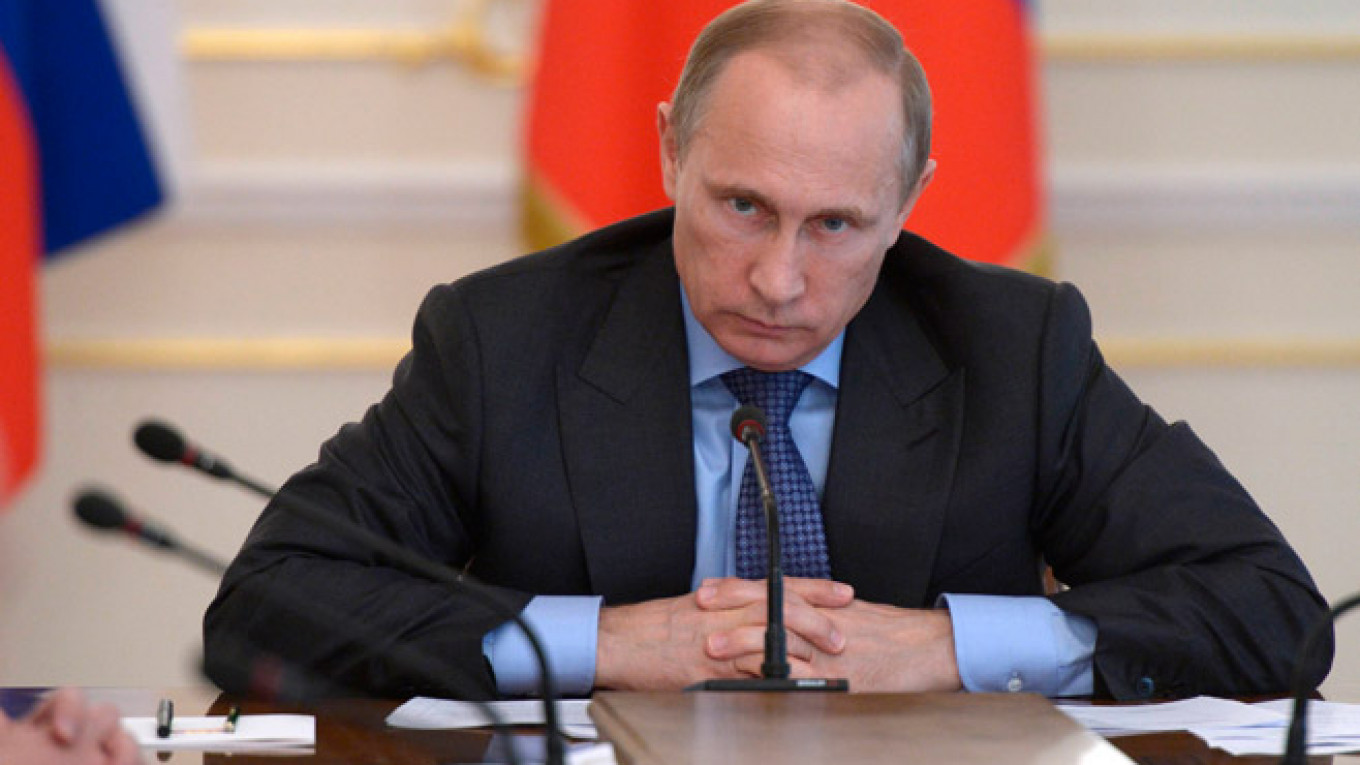Russia may finally have a pretext for bailing out on Ukrainian separatists. But the pretext is not sanctions — it's ethics. Still, the idea will be highly difficult for President Vladimir Putin to transmit, as there are few people who can take the moral high ground in the Russian establishment.
Putin, by popular admission, is caught between a rock and a hard place over eastern Ukraine. His backing of separatists there has earned him record ratings at home, but is increasingly alienating the West — a luxury that Russia, whose stagnating economy is heavily reliant on foreign trade, can ill afford.
But the Kremlin may denounce the separatists, despite their domestic popularity, if an international investigation proves that they shot down a Malaysia Airlines jet over rebel-controlled area earlier this month, prominent journalist Andrei Kolesnikov said Tuesday. "The children, the elderly people and adults slain for nothing are for him … a red line he would not cross," Kolesnikov, known as "Putin's favorite journalist," said of the president in a surprisingly unequivocal op-ed on Kommersant FM radio that set pundits and bloggers in Russia abuzz.
"Yes, Vladimir Putin will renounce them," Kolesnikov, the star of the presidential pool who has been following Putin from day one, said of the people he calls "resistance fighters" and whom Western politicians slam as terrorists. This is nothing short of a cop-out, given that the Russian leader has hardly been fazed by violence in the past. The deaths of more than 180 children in a bloody siege of a Beslan school seized by jihadi in 2004 is proof enough, but there is also the long history of atrocities during the two wars in Chechnya and the widespread and often disturbing police violence at home. Separatists' track record on human rights, even before the Malaysia Airlines crash, was less than stellar. There is a war going on in Ukraine, and Putin can't possibly have only realized it now.
But, regardless of whatever face-saving rhetoric Moscow wants to shroud the crash in, it is in Russia's interests to have sanctions lifted, and the verdict of an international investigation into the disaster might prove to be a handy way out. Of even more interest, however, is the medium used to vent the idea, and what it says about the Russian leadership.
Few publications have a more impressive track record of criticizing Putin's regime than the Kommersant publishing house. For years, it got away with pointing out the Kremlin's mistakes and giving a voice to the opposition. Its professional reputation suffered after pro-Putin tycoon Alisher Usmanov purchased it in 2006, but it still retained a certain level of independence. The same could be said of Kolesnikov: Though his affiliation with Putin explains why his op-ed was widely understood as channeling the Kremlin and not just speculation, his ironic reports have always refrained from the sycophantic tone typical of state media coverage of Putin.
The Kremlin has never before needed outsiders to make its public statements. Policy suggestions could always be floated via loyal ministers, subservient lawmakers or the vast media empire comprising television channels with audiences in the millions, radio stations, newspapers, news agencies and public think tanks on a state payroll. Any of those could have said what Kommersant wrote, and yet the job was outsourced to a once-critical newspaper.
The problem is that none of the units in the Kremlin's public empire are fit to take a moral stance. Most ruling elites worldwide are pretty weak on ethics, but Russia's has been especially egregious in this regard. Lawmakers and state officials have tacitly and even ardently backed the Kremlin's most outrageous initiatives — curbing freedoms, fanning homophobia, using orphans for PR gains. The state media deal in blunt propaganda, not journalism. And Putin himself spent 14 years building an image of a strong leader, not an ethical one. If the war ends because Putin denounces the separatists as immoral, it will be hypocrisy serving a good cause. But the very eyebrows raised by this excuse also show that the crisis of Russian leadership is, at heart, an ethical one — and that perhaps it is time to begin scaling back the cynicism on which the Kremlin has built its ideology.
A Message from The Moscow Times:
Dear readers,
We are facing unprecedented challenges. Russia's Prosecutor General's Office has designated The Moscow Times as an "undesirable" organization, criminalizing our work and putting our staff at risk of prosecution. This follows our earlier unjust labeling as a "foreign agent."
These actions are direct attempts to silence independent journalism in Russia. The authorities claim our work "discredits the decisions of the Russian leadership." We see things differently: we strive to provide accurate, unbiased reporting on Russia.
We, the journalists of The Moscow Times, refuse to be silenced. But to continue our work, we need your help.
Your support, no matter how small, makes a world of difference. If you can, please support us monthly starting from just $2. It's quick to set up, and every contribution makes a significant impact.
By supporting The Moscow Times, you're defending open, independent journalism in the face of repression. Thank you for standing with us.
Remind me later.






